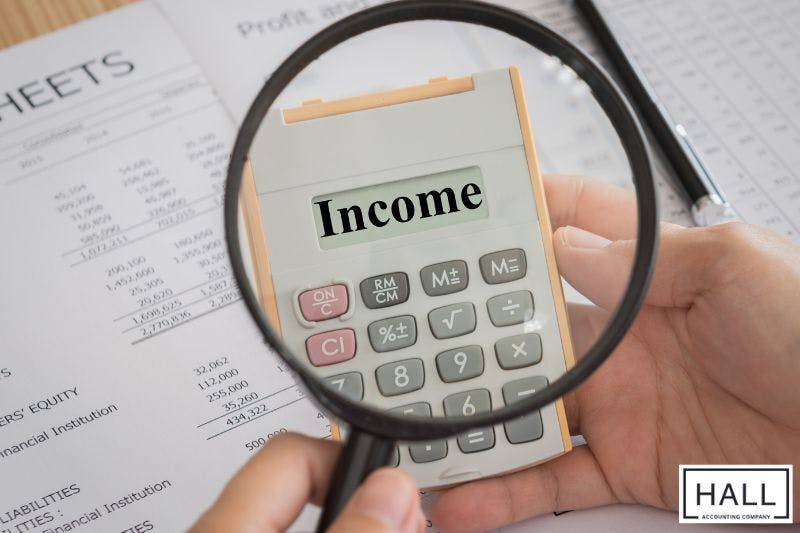
It’s tax season again, and you’re resisting the urge to call your accountant and vent. When you look at your paycheck, it's understandable to wonder why your taxes are high. After all, you're only taking home a fraction of what you earn.
But, believe it or not, that's how it's supposed to work, and there's more to tax withholding than what meets the eye.
In this article, we'll look at why your taxes are so high on your paycheck and what that means for you. We'll also explore some options for reducing that burden in the future. Read on if you want to learn more about tax withholding and how to keep more of your hard-earned money in your pocket!
What is Gross Income?
Before we can understand why your taxes are so high on your paycheck, we need first to define one key term: gross income. Gross income is simply the total amount of money you earn in a period before any deductions are taken out.
It includes wages, salaries, bonuses, commissions, and other taxable income. You subtract any deductions or exemptions you qualify for when calculating your taxable income, which is taxed at various rates depending on your filing status.
Most taxpayers' gross income and taxable incomes are one and the same. However, there are a few instances where that's not the case. For example, if you have income from investments or rental property, that would be considered gross income but not taxable income.
Income Types
Another factor determining your tax bracket is the type of income you earn. There are four types of taxable income:
Earned income
Earned income includes wages, salaries, tips, and other taxable income received through employment. For example, the wages you earn from your day job are considered earned income.
Income from self-employment is also considered earned income. This includes money you make from freelance work, owning a business, or being a contractor.
Unearned income
Unearned income includes interest, dividends, capital gains, and rent. For example, the interest you earn on your savings account is considered unearned income.
Your unearned income is taxed at a lower rate than your earned income to incentivize savings and investment.
Tax-exempt income
Tax-exempt income includes certain government benefits, such as Social Security income or unemployment benefits. These types of income are not taxable by the federal government.
In some cases, you may exclude certain types of income from your taxable income, including the foreign earned income of U.S. citizens who live and work abroad and some military pensions.
Other income
Other taxable income includes alimony, gambling winnings, and income from selling property.
Why are my taxes so high? The effect of payroll and federal taxes

Now that we've defined gross income, let's look at the different types of deductions that can reduce your tax bill.
The first and most common type of deduction is payroll taxes. Payroll taxes are a set of taxes automatically withheld from your paycheck. Your employer calculates these taxes and sends the money to the government on your behalf.
Payroll taxes
Social Security Tax
The Social Security tax is a 6.2% deduction that goes towards funding Social Security. The government uses the funds to provide retirement and disability benefits to workers and dependents.
So, for every $100 you earn, your employer will withhold $6.20 and send it to the government. This tax is applied to all income up to a certain limit, which changes annually.
Medicare Tax
The Medicare tax is a 1.45% deduction that goes towards funding Medicare, a government-run health insurance program. In this case, your money goes towards providing health insurance for
Seniors(65+.)
Individuals with certain disabilities
Permanent kidney failure patients
Anybody eligible for Medicare
The Medicare tax accounts for 1.45% of all income, regardless of how much you make. So, for every $100 you earn, your employer will withhold $1.45 and send it to the government. Combined, the Social Security and Medicare taxes make up a fraction of your deductions, accounting for 7.65% of your income.
Federal Income Tax
Unfortunately everyone must pay federal income taxes if you are employed. Federal income taxes are a deduction withheld from your paycheck based on your taxable income. This tax is imposed by the Federal Government and applies to all income levels.
The percentage you pay in federal income tax depends on various factors, such as your filing status and income level and are called tax brackets. Your filing status can be:
Single
Defined as a taxpayer who is not married and does not have any dependents
Married, filing jointly
Taxpayers who are legally married and file jointly are subject to a lower tax rate than those who file separately.
The marginal tax rate for married couples are higher than those for singles to account for the fact that both spouses typically have taxable income.
Married, filing separately
If you're married but file separately, you will be taxed at a higher rate than filed jointly. This is because you and your spouse are considered two separate taxpayers.
Head of household
This filing status is for unmarried taxpayers who have dependents living with them. The percentage you pay in federal income tax depends on your income level.
Qualifying Widow(er)
This status is for widows and widowers who have not remarried and have a dependent or a child.
The effect of other deductions on your taxes
State and local income taxes
The Federal Government isn't the only one that takes a chunk out of your paycheck. Forty-one states also have income taxes, and the amount you pay varies depending on which state you live in. Some states, such as Colorado (4.55%) and Illinois (4.95%), have flat-rate deductions, which means everyone in the state pays the same percentage in income taxes.
Other states, such as California and New York, have deductions based on a table. That means the percentage you pay in income taxes depends on your income level.
Finally, nine states, including Florida and Alaska, do not have state income taxes.
Medical, dental or vision premiums

Some companies have a program where they will reimburse you for your medical, dental, or vision premiums. Every employee contributes to a pool used to reimburse employees for these types of expenses.
Although you might get reimbursed, the premiums are still considered taxable income. This is because the company doesn't actually give you any money--it just takes the money out of your paycheck before taxes are taken out.
Retirement Income
You receive retirement income from a retirement account, such as a 401(k) or IRA. This income is not taxed when you receive it, but it will be taxable when you withdraw it in the future.
There are two types of retirement income:
Traditional Retirement Income: Traditional retirement income is income that is taxed when you receive it. For example, if you withdraw money from your 401(k) account, that money will be taxed as income.
Traditional retirement income is usually tax-deferred, which means you can postpone paying taxes on the income until you retire.
Roth Retirement Income: Roth retirement income is income that is not taxed when you receive it. For example, if you withdraw money from your Roth IRA account, that money will not be taxed.
Roth retirement income is not tax-deferred, which means you have to pay taxes on the income when you receive it.
Student loan interest
Student loan interest is any interest you pay on a student loan. You can deduct up to $2,500 in student loan interest from your taxable income each year. The federal government does not tax this type of interest.
Change or removal of tax credits

Tax credits are dollar-for-dollar amounts that the tax system allows for for tax payers to reduce their income tax liability. For example, during the pandemic tax credits were given to certain eligible groups to provide tax relief during the Covid crisis. A higher tax bill may mean the federal tax code has changed regarding these credits. You can check with the internal revenue service if you’re unsure about this.
The team at Hall Accounting Company offers tax planning services for individuals which can help you to reduce your tax liability. We can speak to you about a health savings account and other investments and allowable deductions that will give you more money in your pocket. Call us now.
How to change your take-home pay
There are many different reasons why your paycheck might have a lot of deductions. But don't worry, you're not alone! Most people have to pay taxes on their income, and there are many different types of taxes.
The good news is that the IRS has a Withholding Calculator tool that can help you figure out how much tax to withhold from your paycheck.
The Withholding Calculator can help you determine if you have too much or too little tax withheld from your paycheck. It can also help you calculate your estimated tax payments.
Withholding allowances

The Withholding Calculator also helps you figure out your withholding allowances. Your withholding allowances are the number of allowances you claim on your W-4 form.
Your withholding allowance determines how much tax is withheld from your paycheck. If you have too much tax withheld, you will get a refund when you file your taxes. But if you have too little tax withheld, you will have to pay taxes when you file your taxes.
Some people like to get a big refund each year, while others would rather have more money in their paycheck each week. It's up to you to decide how many allowances you want to claim. Note that it is recommended to pocket more money each paycheck and invest that money periodically.
How do I adjust my tax deductions?
If you want to adjust your tax deductions, you can change your W-4 form. The W-4 form is your employer's form to figure out how much tax to withhold from your paycheck. You can change your W-4 form at any time by filling out a new W-4 and giving it to your employer.
Final Thoughts
High income tax is a concern for everyone. But you can start doing something about the amount of taxes you pay today. It’s called tax planning.
Tax planning is a service offered to individual taxpayers, like yourself. It helps you to plan the amount of tax you pay and never be caught off guard again. It’s really difficult to get this done when you don’t have all the information about tax rules and regulations. We understand. So at Hall Accounting Company we have specialized tax planning services for individual taxpayers.
During the initial consultation we’ll sit down with you to discover all the taxes that you are paying and why your taxes are so high. Then we’ll start tackling the issues one by one.
The best time to start doing this is now. Don’t let one more month pass without addressing this issue. Our team of experts know how to get tax relief for our clients. Call us today.